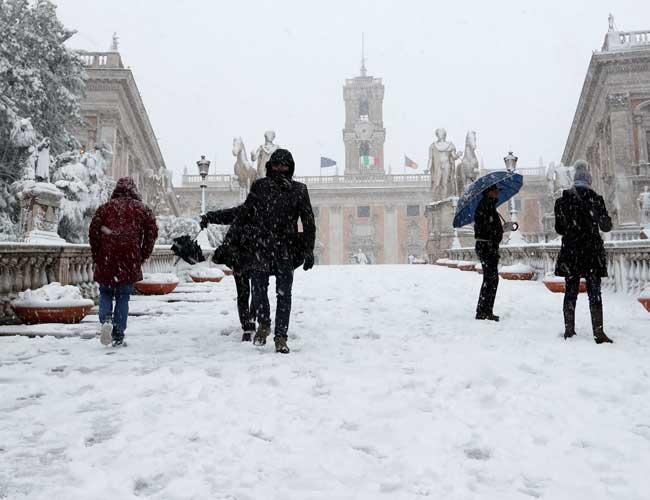
Rome woke to its first snowfall in six years yesterday as chilling winds from Siberia swept across Europe, bringing freezing temperatures that have claimed at least four lives, closed schools and disrupted travel.
The “Beast from the East,” as the phenomenon has been dubbed by the British media, is expected to bring cold air from Russia over the next few days that will make it feel even chillier than thermometers indicate.
Rome saw its first snowfall since February 2012, with about three to four centimeters settling on the ground.
Schools were closed in the Italian capital as local authorities opened several train stations as emergency shelters for the homeless.
It was zero degrees Celsius in Rome on Feb. 26 morning, with a low of minus six Celsius forecast until Feb. 28 -- but no more snow is forecast.
In the north Italian city of Turin, heavy snow had caused a Serie A football game between Juventus and Atalanta to be postponed on Feb. 25.
Two people have died of the cold in Poland since Feb. 24, bringing the winter’s toll to 48 since November, according to the center for national security.
Three people in Lithuania have also died due to exposure over the past three days, the Baltic News Service (BNS) reported, as weekend temperatures plunged to -24 degrees Celsius.
In France, where temperatures were forecast to drop to minus 10 degrees Celsius and feel as low as -18 Celsius over the coming days, emergency shelters were opened for the homeless.
A homeless man in the city of Valence in the country’s southeast was found dead on Feb. 25, after another man was found dead in his cabin in the suburbs of Paris on Friday. Both deaths were believed to have been linked to the cold.
Britain’s weather service, the Met Office, issued a yellow weather warning on Feb. 26 and amber warnings for Feb. 27 and 28, with more snow expected in eastern England.
“This week looks like being the coldest period we have had in the U.K. for a number of years,” the Met said on Feb. 25.
“Parts of England and Wales are likely to see their coldest spell of weather since at least 2013 -- perhaps 1991,” said Frank Saunders, the Met Office chief forecaster.
In Berlin, where at least 3,000 people are estimated to be living on the streets, overnight shelters for the homeless were 95 percent full, and overcrowding was feared in coming nights, as temperatures drop as low as -20 Celsius, reported local public radio RBB.
Undeterred by the icy conditions, surfers in thick wetsuits rode Munich’s famous continuous wave of the Isar River’s Eisbach channel on Feb. 25 morning, ZDF television showed.
Russia itself was not spared, with its meteorological service warning of “abnormally cold” temperatures of between -14 Celsius during the day and -minus 24 Celsius overnight.
In Sweden, where the cold -snap coincided with schools’ winter sports break, most were happy to see the snow, with temperatures ranging from -5 Celsius in Stockholm to -20 in the mountains near Ostersund, where many Swedes were spending ski holidays.
However, the snowfall did cause about 20 flights to be canceled at Stockholm’s Arlanda airport, primarily to European destinations, according to airport operator Swedavia.